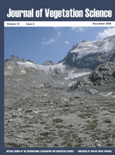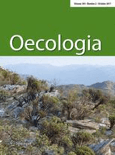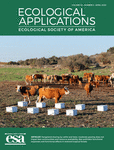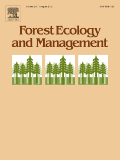
ECOGRAPHY
Scope & Guideline
Enhancing Understanding of Life's Interconnectedness
Introduction
Aims and Scopes
- Biodiversity and Ecosystem Functioning:
Research exploring how biodiversity influences ecosystem processes and functions, including productivity, nutrient cycling, and resilience to disturbances. - Species Distribution Modeling:
Studies that develop and apply models to predict species distributions based on environmental variables, improving conservation strategies and understanding species' responses to climate change. - Ecological Interactions and Community Dynamics:
Investigations into the interactions among species, including predator-prey dynamics, mutualisms, and competition, and how these relationships shape community structure. - Environmental Change and Impact Assessment:
Research assessing the impacts of climate change, habitat alteration, and human activities on ecological systems, aiming to inform conservation and management practices. - Phylogenetic and Functional Diversity:
Studies that integrate phylogenetic and functional traits to understand community assembly, diversity patterns, and the effects of evolutionary history on ecological processes. - Data Integration and Methodological Advances:
Innovations in ecological modeling and data integration techniques, including the use of citizen science, remote sensing, and big data to enhance ecological research.
Trending and Emerging
- Climate Change and Biodiversity Responses:
A growing number of studies are focusing on how climate change affects species distributions, community dynamics, and ecosystem functions, highlighting the urgent need for adaptive conservation strategies. - Integration of Genomic Data and Ecology:
Research that combines genomic data with ecological modeling to understand species adaptation, diversity patterns, and responses to environmental changes is on the rise, showcasing the interplay between genetics and ecology. - Ecological Network Analysis:
There is a trend towards examining ecological networks, including food webs and mutualistic interactions, to understand complex interdependencies and their implications for ecosystem stability. - Citizen Science and Public Engagement:
The increasing use of citizen science data for ecological research reflects a trend towards greater public involvement in biodiversity monitoring and data collection, enhancing the scope and reach of ecological studies. - Machine Learning and Advanced Modeling Techniques:
The adoption of machine learning and advanced statistical methods in ecological modeling is becoming more prevalent, allowing for more nuanced and accurate predictions of ecological phenomena. - Urban Ecology and Anthropogenic Effects:
Research examining the impacts of urbanization and land-use change on biodiversity and ecosystem services is gaining prominence, addressing the challenges posed by rapid urban development.
Declining or Waning
- Traditional Habitat Studies:
Research primarily focused on static habitat descriptions and classifications has decreased, as the field moves towards dynamic modeling approaches that incorporate environmental changes and species interactions. - Local vs. Global Scale Comparisons:
Studies that focus solely on local ecological phenomena without considering broader, global implications are less frequently published, as there is a growing emphasis on understanding ecological processes at multiple scales. - Descriptive Biodiversity Assessments:
Papers dedicated solely to cataloging biodiversity without engaging in analysis of ecological implications or processes have seen a decline, as the journal prioritizes studies that link biodiversity to ecosystem functioning and environmental change. - Conventional Statistical Analyses:
The use of traditional statistical methods without the integration of modern computational techniques or machine learning approaches is diminishing, reflecting a shift towards more sophisticated analytical frameworks. - Static Conservation Strategies:
Research advocating for static conservation measures without incorporating adaptive management practices in response to ongoing environmental changes has become less common.
Similar Journals

Neotropical Biodiversity
Championing biodiversity for a sustainable tomorrow.Neotropical Biodiversity is a prominent journal dedicated to advancing our understanding of biodiversity and ecological dynamics within the Neotropical region. Published by TAYLOR & FRANCIS LTD in the United Kingdom, this Open Access journal has been providing unrestricted access to research findings since 2015, fostering collaboration and knowledge sharing among the global scientific community. With an emphasis on innovative research in Ecology, Ecology, Evolution, Behavior and Systematics, and Global and Planetary Change, it has earned a reputation for excellence, currently holding a Q3 category in its field. As of 2023, the journal ranks in the 37th percentile for Environmental Science (Ecology) and in the 36th percentile for Agricultural and Biological Sciences (Ecology, Evolution, Behavior and Systematics), making it a valuable resource for researchers, professionals, and students interested in understanding and preserving biodiversity in one of the world's most diverse ecosystems. We invite you to explore the cutting-edge research published in Neotropical Biodiversity and contribute to the ongoing dialogue for environmental sustainability and ecological resilience.

Ecologies
Unveiling the complexities of nature for a thriving planet.Ecologies is a dynamic open-access journal published by MDPI, based in Switzerland, which focuses on the interdisciplinary study of ecological and environmental sciences. Since its inception in 2020, the journal has made significant strides in contributing to our understanding of complex ecological interactions, evolutionary processes, and the implications of biological diversity on ecosystem functionality. With its categorization in Q2 for Ecology and various Q3 rankings in related fields, it proudly offers a platform for innovative research that aims to address pressing ecological challenges. Researchers, professionals, and students can benefit from its comprehensive and insightful articles that are freely accessible, ensuring that critical findings are disseminated widely to facilitate informed decision-making and foster collaboration across disciplines. With the impact of climate change and biodiversity loss at the forefront of global discussions, Ecologies plays a pivotal role in shaping the future of ecological research and policy implementation.

ACTA OECOLOGICA-INTERNATIONAL JOURNAL OF ECOLOGY
Connecting Scholars to Transform Ecological PracticesACTA OECOLOGICA-INTERNATIONAL JOURNAL OF ECOLOGY, published by Elsevier, stands as a prominent platform for disseminating innovative research in the diverse field of ecology. Operating since 1983 and continuing to make significant contributions into 2024, this journal features critical studies that advance our understanding of ecological systems, behaviors, and conservation efforts. With an impressive Q2 ranking in both the ecology and nature conservation categories, it exemplifies high-quality scholarship, reflected in its Scopus rankings—#74 in Environmental Science and #254 in Agricultural and Biological Sciences. Researchers, professionals, and students in the field are invited to explore the latest findings and methodologies that address pivotal ecological issues. As a journal committed to fostering academic collaboration, ACTA OECOLOGICA is essential for anyone dedicated to enhancing their comprehension of ecological dynamics and advancing sustainability practices globally.

JOURNAL OF VEGETATION SCIENCE
Championing high-quality research in plant sciences.JOURNAL OF VEGETATION SCIENCE, published by Wiley, stands as a premier platform for disseminating high-quality research within the fields of ecology and plant science. With an impressive rank of #80 out of 516 in Plant Science and #81 out of 461 in Ecology according to Scopus, this esteemed journal is recognized for its significant contributions to advancing knowledge and understanding of vegetation dynamics and biodiversity. Since its inception in 1990, JOURNAL OF VEGETATION SCIENCE has been committed to providing a forum for researchers, professionals, and students to share their findings and engage in critical discussions about the ecological implications of vegetation studies. While this journal does not currently offer open access, it maintains a reputable impact factor, illustrating its importance in contemporary ecological and botanical research. With its Q1 categorization in both Ecology and Plant Science for 2023, it continues to shape and influence the discourse in these disciplines through rigorous peer-reviewed articles, reviews, and synthesis papers.

FOLIA GEOBOTANICA
Uncovering the past to illuminate the future of plant ecology.FOLIA GEOBOTANICA, published by Springer, is a distinguished journal dedicated to advancing the fields of Paleontology and Plant Science through the dissemination of high-quality research. With an ISSN of 1211-9520 and an E-ISSN of 1874-9348, this journal has been pivotal in providing a platform for innovative studies from 1994 to 2024. Notably, FOLIA GEOBOTANICA holds a Q3 ranking in Paleontology and a Q2 ranking in Plant Science as of 2023, affirming its relevance and contribution to the scholarly community. The journal is located in the Netherlands at VAN GODEWIJCKSTRAAT 30, 3311 GZ DORDRECHT, and is not an Open Access publication, ensuring comprehensive review processes and scholarly integrity. With Scopus rankings that place it in the 50th percentile for Plant Science and 46th for Paleontology, FOLIA GEOBOTANICA continues to attract researchers, professionals, and students who are keen to explore the intricacies of plant ecology and fossil records, thereby fostering a deeper understanding of ecological and evolutionary patterns.

Frontiers in Ecology and Evolution
Unveiling the complexities of life through ecology and evolution.Frontiers in Ecology and Evolution, published by FRONTIERS MEDIA SA, stands as a premier open-access journal dedicated to the exploration and discourse in the interdisciplinary fields of ecology and evolutionary biology. With its inception in 2013, this journal has rapidly ascended to a prestigious position, securing a Q1 ranking in both Ecology and Ecology, Evolution, Behavior and Systematics categories, reflecting its influential impact in the respective fields. Operative from Switzerland, Frontiers in Ecology and Evolution enables researchers, professionals, and students to access high-quality research without barriers, promoting collaboration and innovation. The journal covers a broad range of topics, from ecological dynamics to evolutionary strategies, facilitating profound insights that drive scientific advancement and understanding. With a remarkable position in Scopus rankings—ranking #218 in Ecology, Evolution, Behavior and Systematics and #145 in Environmental Science—this journal is essential for anyone keen on contributing to or staying updated with contemporary research in ecology and evolution.

OECOLOGIA
Advancing Ecological Insights for a Sustainable FutureOECOLOGIA is a prestigious journal dedicated to the interdisciplinary fields of ecology, evolution, behavior, and systematics, published by Springer. Established in 1968, this journal has consistently contributed to the scientific community, maintaining a strong impact factor reflected in its Q1 ranking within its category for 2023, and an impressive 79th percentile among 721 journals in the Scopus rank for Agricultural and Biological Sciences. With a commitment to advancing ecological knowledge and fostering innovative research, OECOLOGIA serves as a vital platform for researchers, professionals, and students exploring complex ecological dynamics and evolutionary processes. Although it does not offer open access, the journal remains dedicated to high-quality, peer-reviewed publications that inspire and inform the next generation of ecological science. For those interested in the latest trends and significant findings in biology and ecology, OECOLOGIA is an essential resource that continues to shape the discourse and understanding in these critical fields.

ECOLOGICAL APPLICATIONS
Empowering ecologists with cutting-edge research.ECOLOGICAL APPLICATIONS, published by WILEY, is a leading journal in the field of ecology, providing a platform for innovative research that addresses the understanding and management of ecological systems. With an ISSN of 1051-0761 and E-ISSN of 1939-5582, it has established itself as a vital resource for ecologists and environmental scientists since its inception in 1991. Ranked in the top quartile (Q1) for Ecology in 2023 and with a Scopus ranking of 40 out of 461 in Environmental Science, ECOLOGICAL APPLICATIONS boasts an impressive impact factor, attesting to its significance and influence in the field. The journal's mission is to publish peer-reviewed articles that contribute to ecological theory and its applications in conservation and environmental management. Researchers, professionals, and students alike will find invaluable insights and the latest developments in ecological research through its comprehensive scope and rigorous scholarship, ensuring a crucial role in shaping future ecological practices and policies.

BIOTA NEOTROPICA
Fostering Collaboration in Ecology and EvolutionBIOTA NEOTROPICA is a prominent open access journal dedicated to advancing knowledge in the interdisciplinary field of ecology, evolution, behavior, and systematics. Published by REVISTA BIOTA NEOTROPICA since 2001, this Brazilian journal aims to provide a platform for high-quality research that fosters a deeper understanding of Neotropical biodiversity and its conservation. With an ISSN of 1676-0603 and an E-ISSN of 1676-0611, the journal has established its reputation within academic circles, ranking in the Q3 quartile for Ecology and achieving a respectable percentile of 57 in Scopus’s metrics. Operating from its headquarters in Campinas, SP, Brazil, BIOTA NEOTROPICA not only focuses on research dissemination but also encourages collaboration and exchange of ideas among scientists, students, and professionals in the field. The journal is particularly valuable for those looking to contribute to the understanding of ecological systems and promotes accessibility with its open access model.

FOREST ECOLOGY AND MANAGEMENT
Connecting Research to Policy for Forest SustainabilityFOREST ECOLOGY AND MANAGEMENT is a premier peer-reviewed journal dedicated to the integral study of forest ecosystems and their management, published by Elsevier in the Netherlands. With an impactful presence in the field, this journal boasts a prestigious Q1 ranking in multiple categories, including Forestry, Management, Monitoring, Policy and Law, and Nature and Landscape Conservation as of 2023. It addresses key issues relevant to sustainable forest practices, conservation strategies, and environmental monitoring, making it a vital resource for researchers, practitioners, and policymakers alike. The journal is indexed with an impressive Scopus rank, placing it among the top tier of titles in Agricultural and Biological Sciences and Environmental Science. While it does not offer Open Access options, its rigorous review process and high visibility make it essential for those seeking to stay abreast of the latest findings and trends in forest ecology and management. Published continuously since 1976, FOREST ECOLOGY AND MANAGEMENT aims to foster interdisciplinary collaboration and advance knowledge critical to the stewardship of forest resources in an ever-changing global landscape.